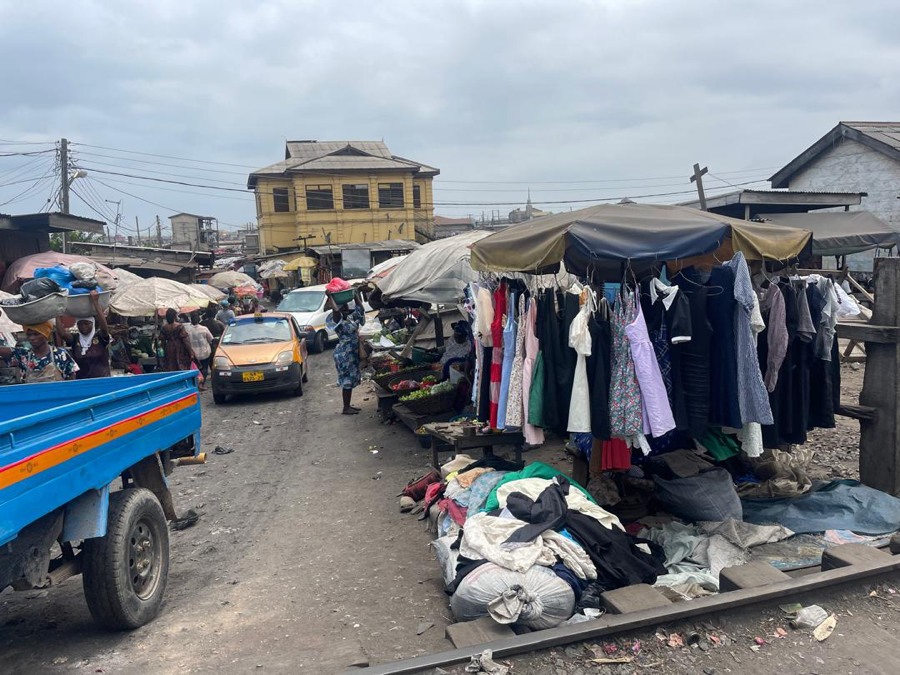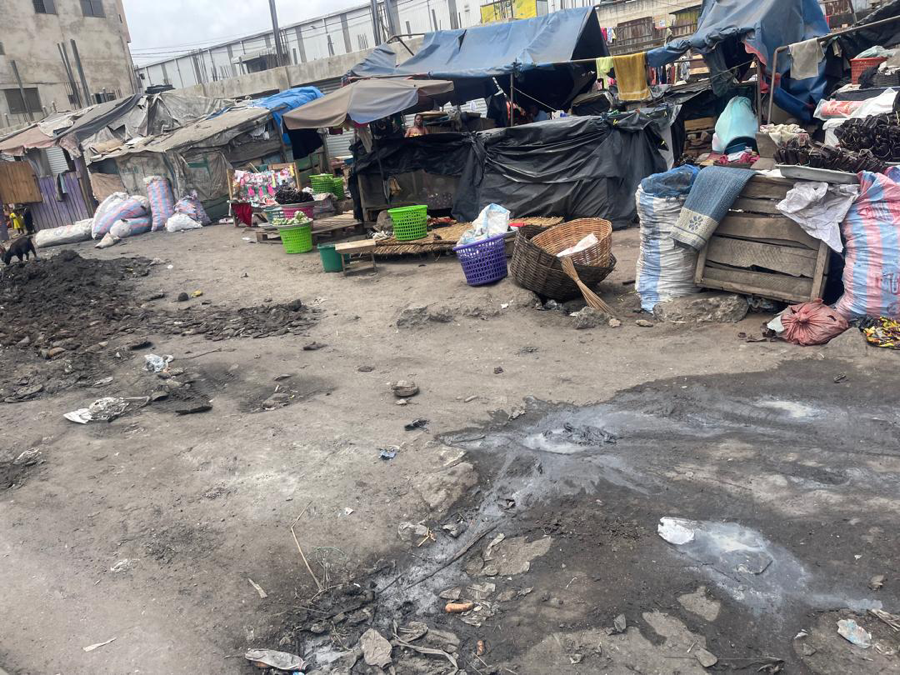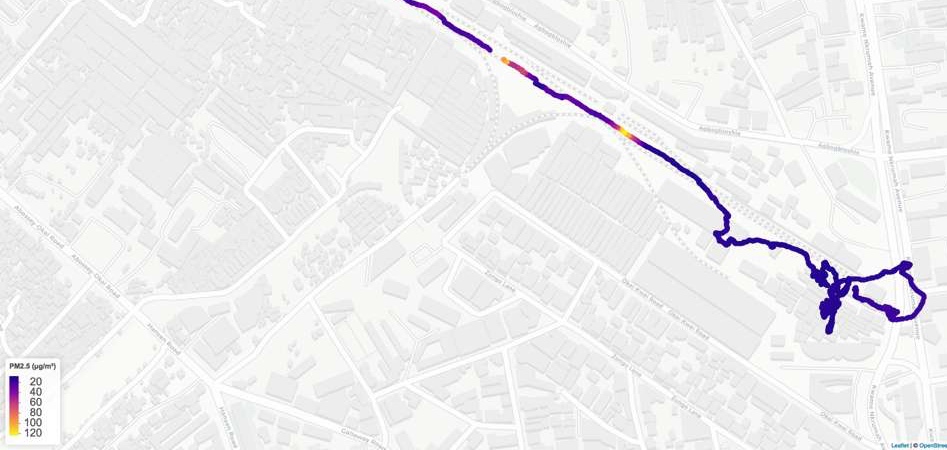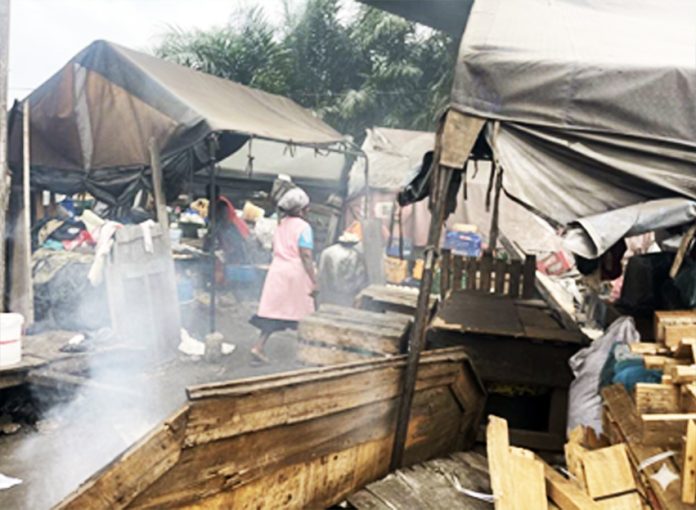A woman walks through the smoky alleys of Agbogbloshie, where traders struggle to make a living amid pollution and poor sanitation.
AGBOGBLOSHIE, Accra –Here in the notorious informal community on the edge of the capital city, Efua Mensah along with the rest of the market sellers, wakes up to a haze.The smoke from fires – cooking and waste burning – never leaves the 46-year-old cancer survivor. It curls over the wooden stalls and settles in the folds of the bright plastic bowls she uses to carry tomatoes to market.
Efua’s hands move with the practiced rhythm of someone who has sold tomatoes for more than twenty years. She weighs, calls, and bargains. But since her diagnosis with breast cancer two years ago the smoke has become a menace. Doctors have warned: it could cost her life.
“I don’t have the strength I used to,” Efua says speaking in Twi language and adjusting a basket of tomatoes.“Sometimes I feel like my body is reminding me of everything it has been through. But I cannot stop working. This market is what feeds my family. If I don’t sit here, my children will go hungry, and that thought gives me the strength to keep going.”
Efua is part of a growing number of Ghanaian women who are developing breast cancer. In Ghana, it is estimated that one in 22 women will develop the deadly disease in her lifetime. Each year about 5,000 people are diagnosed and nearly 2,300 die, according to Global Cancer Observatory.Breast cancer is now the most commonly diagnosed cancer worldwide and one of the leading causes of cancer deaths among women.
While a range of factors are considered possible causes, in recent years researchers are focusing on a new one: air pollution. Recent research from around the world shows that women living in high-pollution areas—especially with more nitrogen dioxide (a marker of traffic emissions) -face a higher chance of developing breast cancer. A large U.S. study found an 8 percent higher incidence in women exposed to elevated levels of the fine particles, known as PM2.5, that are most dangerous to human health.
Air pollution is a growing problem in Accra – one of Africa’s fastest growing cities. A new study monitoring over 60 sites across Greater Accra from 2024 to 2025 found that Accra’s average concentration of the most dangerous air pollution is more than seven times higher than the World Health Organization guidelines.
According to the Clean Air Fund, roughly 3,000 premature deaths per year in Accra are now attributed to air pollution, adding to the health burden from asthma, cardiovascular disease, lung cancer and other illnesses that it causes or exacerbates.
But it’s informal settlements like Agogbloshie, home to Ghana’s poor, that experts say are most at risk anda glaring marker of health inequality. Agbogbloshie, a former wetland, is now one of the biggest electronic waste recycling areas in the world with a global reputation for its toxic smoke. Burning and breaking down old electronics releases harmful substances like lead, cadmium. Studies have shown that many market women there suffer from breathing problems and poor lung health.

Traders and vehicles navigate the crowded lanes of Agbogbloshie Market, where stalls line both sides of the road.
Lily Ama Appiagyei, an air pollution expert, said some of the heavy metals and substances can interfere with normal hormone functions and damage human cells, increasing the risk of breast cancer.
Efua found a lump in her left breast in 2023. At Korle Bu Hospital, the diagnosis came back blunt: Stage II breast cancer.
“When the doctor told me, I felt my whole world collapse,” she recalls. “I kept thinking, what will happen to my children? At night I couldn’t sleep. I would lie awake imagining the worst, but in the morning, I had to rise and act strong, because I didn’t want my children to see my fear.”
The months that followed were a blur of hospital corridors and treatment schedules. She underwent surgery, followed by months of chemotherapy and radiotherapy that weakened her body.
“There were days when even lifting a bowl of tomatoes felt impossible,” she says. “I lost my hair, I lost weight, and I felt like I was losing myself. But I told myself that if I gave up, then the sickness had already won. So even when my body said no, I tried to keep moving, because I wanted my children to see that their mother was fighting.”
Fellow traders and her sister took turns helping to sell her wares. Gradually she recovered and this year was given the news that she is cancer free.
Today Efua watches the black haze rise above the shacks and
wonders aloud if the air she breathes might one day force her back into a hospital bed. “I have beaten cancer once, but sometimes it feels like I am still fighting every single day,” she saysquietly. “It’s frightening, but where else can I go? This market is my life, my family’s life. Every breath here feels like both survival and danger.”
Air Quality Monitoring Shows the Danger
Experts say Efua is right to worry. This reporter carried a mobile monitoring device provided by OpenSeneca—under the guidance of a Ghana-based nonprofit Clean Air One Atmosphere (CAOA) –to assess the air pollution in the area. The data showed people were constantly exposed to high levels of fine particles – the most dangerous form of air pollution – including gases that are known to have a high cancer risk.
“It highlights the significant amount of carcinogens traders, hawkers, and vulnerable groups such as women/ pregnant women and children including those with existing health conditions that could be exacerbated by exposure to air pollution,” says Lily. “This finding is very disturbing because we take nearly 12-20 breaths per minute which is about 6-8 liters of air and people should not be poisoned for their right to life through exposure to dirty air due to the lack of appropriate leadership and mitigation strategies.”
Lily calls for quick action to protect people’s health. She said open-air burning of e-waste should be banned, and safer recycling methods should be used. She also urged stronger air quality checks, better control of car emissions, and the use of public transport. In addition, she suggested public education, regular health screenings, and early breast cancer detection for women at risk.

Traders at Agbogbloshie operate in challenging conditions, surrounded by heaps of waste and poor sanitation
Since 2021, Ghana’s government has mounted repeated attempts to reclaim and sanitize Agbogbloshie. The demolition of hundreds of makeshift workshops and homes was cast as a bold environmental cleanup meant to rid the area of open burning of e-waste. Authorities pledged to relocate scrap dealers to a new recycling center outside the city and to restore the Korle Lagoon, whose dark waters have carried the site’s pollutants into the Gulf of Guinea.
But years after the bulldozers moved in, the air around Agbogbloshie remains heavy with smoke and the acrid tang of burning plastic.Government clean-up campaigns and international partnerships — including projects with Germany’s GIZ and the Accra Metropolitan Assembly to introduce safer cable-stripping and waste collection — have made only modest dents in pollution levels.
Scrap workers have trickled back, reigniting the small fires that feed the trade. Critics say that without a sustained plan for soil remediation, monitoring, and enforcement, the government’s interventions risk becoming another cycle of demolition and return — a visible purge that leaves the toxic air largely unchanged.

The trail taken by this reporter with the air pollution monitor from Accra Central to Agogbloshie at between 1:00AM to 1:00 pm shows areas with what experts called “disturbing” levels of air pollution
Gilbert Nii Ankrah, public relations officer for the Accra Metropolitan Assembly which is in charge of the area, did not respond to a request for comment by deadline.
Early Detection Essential To Beating Cancer But Opportunities Are Missed
Efua was lucky. She caught the cancer early. Most Ghanaian women do not.
“About 60–80 percent of breast cancer patients present in Stage III and IV,” according to Dr Josephine Nsaful, president of the Breast Society of Ghana. At early stages survival rates can be 90 percent in Ghana as they are elsewhere in the world.
Myths and stigma compound the problem. “There are a lot of misconceptions.People think breast cancer is a spiritual disease or that there is some cure elsewhere,” Dr Nsaful says. “Because the lump is not painful at first, women delay. The stigmatization doesn’t help. People would rather pretend they don’t have it, and by the time they come, it’s no longer curable.”
For her, the solution is clear: “The way forward is early detection and decentralization of breast cancer care. Every woman should examine her breasts monthly. Even without enough mammograms, clinical breast examination by a nurse or doctor once a year is a good start.”
Sadly, she notes that as the number of cases goes up so are the number of cases in younger women. “It is very alarming that we see women in their 30s and even in their 20s with breast cancer. And unfortunately, in young women we often see the aggressive subtype of breast cancer.”
Appiagyei wants to see an urgent and serious clean up at Agbogbloshie. She said open-air burning of e-waste should be banned, and safer recycling methods should be used. She also urged stronger air quality checks, better control of car emissions, and the use of public transport. In addition, she suggested public education, regular health screenings, and early breast cancer detection for women at risk.
In the meantime she strongly urges that locals protect themselves immediately.
“Folks at and around Agbogbloshie and those in traffic dominated areas where nose masks to protect themselves as a short-term precautionary measure,” Lilly recommends.
For women like Efua, the market continues to be both a livelihood and a trap: it feeds their families while exposing them to risks that may one day take their lives.
This story was a collaboration with New Narratives. Funding was provided by the Clean Air Fund. The donor had no say in the story’s content.









